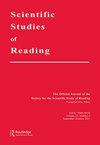在正字法一致语言中,口语技能对早期阅读发展的影响
IF 2.4
2区 教育学
Q1 EDUCATION & EDUCATIONAL RESEARCH
引用次数: 2
摘要
摘要目的本研究通过测试141名一年级儿童的早期阅读发展统一模型,检验了词汇、语音和形态意识对一致希腊语正写法早期阅读技能的直接或间接影响。方法在一年级中对词汇、语音和形态意识进行评估,而在同一年级末对单词阅读准确性、单词阅读流畅性和阅读理解进行测量。结果结构方程模型的结果表明,语音意识直接预测单词阅读的准确性,从而介导语音意识对阅读理解和单词阅读流畅性的影响。词汇直接支持阅读理解,词汇也介导了形态意识对阅读理解的影响。形态意识通过语音意识对单词阅读准确性产生间接影响,并通过这一远端路径间接预测阅读理解和单词阅读流畅性。结论研究结果突出了口语与早期阅读技能之间的复杂关系,并表明尽管口语技能的效果可能因阅读结果而异,但它们都能显著促进早期阅读发展。因此,在阅读教学中应包括这些内容。本文章由计算机程序翻译,如有差异,请以英文原文为准。
Modeling the Effects of Oral Language Skills on Early Reading Development in an Orthographically Consistent Language
ABSTRACT Purpose The present study examined the nature of the effects (direct or indirect) of vocabulary, phonological and morphological awareness on early reading skills in the consistent Greek orthography by testing a unifying model of early reading development in a sample of 141 first-grade children. Method Vocabulary, phonological and morphological awareness were assessed in the middle of grade 1, whereas word reading accuracy, word reading fluency, and reading comprehension were measured at the end of the same grade. Results Results from structural equation modeling showed that phonological awareness directly predicted word reading accuracy, which mediated the effects of phonological awareness on reading comprehension and word reading fluency. Reading comprehension was directly supported by vocabulary, which also mediated the effect of morphological awareness on reading comprehension. Morphological awareness had an indirect effect on word reading accuracy through phonological awareness and via this distal path indirectly predicted reading comprehension and word reading fluency. Conclusion Findings highlight the complex relations between oral language and early reading skills and suggest that, although the effects of oral language skills may differ depending on the reading outcome, all of them can significantly promote early reading development. Therefore, they should be included during reading instruction.
求助全文
通过发布文献求助,成功后即可免费获取论文全文。
去求助
来源期刊

Scientific Studies of Reading
Multiple-
CiteScore
7.20
自引率
2.70%
发文量
26
期刊介绍:
This journal publishes original empirical investigations dealing with all aspects of reading and its related areas, and, occasionally, scholarly reviews of the literature, papers focused on theory development, and discussions of social policy issues. Papers range from very basic studies to those whose main thrust is toward educational practice. The journal also includes work on "all aspects of reading and its related areas," a phrase that is sufficiently general to encompass issues related to word recognition, comprehension, writing, intervention, and assessment involving very young children and/or adults.
 求助内容:
求助内容: 应助结果提醒方式:
应助结果提醒方式:


